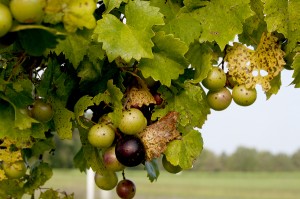What is Muscadine?
The Muscadine Grape is very unique!
 Muscadine (Vitis Rotundifolia) grapes and are native to the Southeastern United States and found growing wild, and in the back yards of many southern homes.
Muscadine (Vitis Rotundifolia) grapes and are native to the Southeastern United States and found growing wild, and in the back yards of many southern homes.
The muscadines are different in several ways. First, the most notable difference is the thick skin of the grape. This thick skin (which accounts for 40% of the weight of the grape) gives muscadine grapes a natural resistance to fungi, disease, and insects, and is where much of the antioxidant power of the muscadine grape is stored.
Second, the muscadine grape has significantly more antioxidant power than other grapes. The muscadine grape skins alone have about 6-8 times as much antioxidant capacity as whole blueberries [7]. Muscadine grapes have been measured as high as 6,800 per 100 grams, compared to 739 for red grapes based on the ORAC standard measurement, [1] [2].
Third, muscadine grapes have an extra set of chromosomes which causes them to produce a unique balance of phytonutrients that are virtually absent in other grapes.
The last difference we want to point out in muscadine grapes and other grapes is the amount of natural resveratrol and ellagic acid. These phytonutrients have been studied as powerful antioxidants with potent anti-cancer properties.
The Health Benefits of the Muscadine Grape
Antioxidants and Anti-inflammatory Agents?
Many of the phytonutrients present in the muscadine grape have been recognized as powerful antioxidants and anti-inflammatory agents – the most powerful of these concentrated in the skins and seeds.
Why are Antioxidants are important? Because they rid the body of free radicals that damage our cells. Free radicals are caused by everyday exposure to radiation, tobacco smoke, pollutants, solvents and even intense exercise. They can even cause damage to DNA, which can cause cell mutations resulting in cancer. Free radicals are of interest to the scientific and medical community because there is strong evidence relating them to aging and disease processes, e.g. atherosclerosis, cancer, immune system decline, brain dysfunction, cataracts, rheumatoid arthritis, birth defects and inflammatory bowel diseases such as Chrohn’s disease and ulcerative colitis.
Free radical production is controlled by several factors including antioxidants consumed as part of the diet. The muscadine grape has over twice the antioxidant power as the blueberry based on the USDA and Tufts University’s Oxygen Radical Absorbance Capacity (ORAC) standard measurement [1] [2].
Antioxidants (and thcan help prevent the initiation, propagation and termination of free radicals. Some of the most notable phytonutrients studied as antioxidants and anti-inflammatory agents found in the muscadine grape include but are not limited to: Resveratrol, Piceatannol, Ellagic Acid, Catechin, Epicatechin, Quercetin, Myricetin, Pterostilbene, Gallic Acid, Pectin (a dietary fiber), Kaempferol, Vitamin C, Caffeic Acid, Anthocyanidins, OPCs Oligometric Procyanidins.
The Heritage of the Muscadine Grape
The muscadine grape has come to be known as America’s first grape. It is not clear how long muscadine grapes have been growing in the land now known as the United States but they were first written about in 1594. What we do know is that they were part of the Native American diet in the Southeastern US.
About Muscadine
Muscadine Research
Muscadine FAQ
3 Medically Proven Reasons To Take The Shepherds Harvest Muscadine Products:
1. ANTIOXIDANTS – The muscadine grape is nature’s BEST source of them naturally.
2. Our products contain natural RESVERATROL which may SLOW the onset of the diseases caused by AGING (according to research), such as, heart disease, stroke, neurodegenerative disease, inflammatory conditions, arthritis, cancer, Alzheimer’s. and t has been shown to relieve menopausal symptoms.
3. RESEARCH STUDIES back up our claims.
